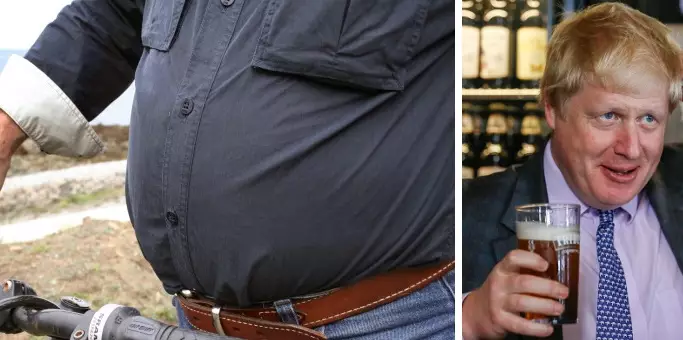
For years beer has been belly's sworn enemy. Depending on your choice of drink, those brewed liquid calories served at the bar could contain anywhere between 150 to 550 calories per pint (580 if you're partial to a vintage cider). Which is why many nutritionists have historically insisted that your alcohol and your abs could never be friends.
Thankfully studies now show that's not strictly true.
So before you give up your beloved barstool, say an emotional goodbye to your favourite barmaid, or take a vow of abstinence and live like a monk, know that nutritional science does offer salvation. So sit back, pour yourself a cold one and read the research helping you understand how you, your beer and your belly can live in harmony once again.
Why Does Beer Get Bad Press?
Advert
First thing first, lets examine why beer was blacklisted.
Typically, beer contains between 2-12% alcohol. Considering alcohol comes a close second to dietary fat in terms of its calorie density - roughly seven calories per gram - it is not surprising the chubby finger of blame was pointed directly at beer for our expanding waistlines.
But the bad news for beer lovers doesn't stop there. Back in 1980 a paper published in the American Journal of Clinical Nutrition stated that alcohol was a non-essential nutrient that contained "empty calories." What this means is. unlike carbohydrates, fats and protein your body has no nutritional need for that cider, wine or solo Sambuca.
So what happened? Alcoholic drinks of all shapes and sizes were vilified. Thousands of articles were printed comparing your glass of wine to several chocolate bars and every trip to the wine cellar came with a serving of guilt.
Advert
Until now...

Credit: Anas Qtiesh via Flickr
Think Beyond Calories
What many people don't consider is beer and alcohol comes in many forms.
Advert
From a foreign fine wine to a locally brewed ale, each one will have a completely different nutritional impact on the body that can be far more interesting than just counting the calorie content on the label.
Let's take red wine as an example. It wasn't long ago now that nutritionists discovered the health-boosting compound resveratrol. This is a natural, fortifying polyphenol the grapes produce to protect themselves from the threat of fungus when growing in the wild.
Making wine with them means when you drink a glass of certain brands high in resveratrol you're also drinking a glass of disease-fighting vitamins, minerals and micronutrients which experts from the University of Illinois in Chicago said have, "anti-inflammatory, neuroprotective and antiviral properties."
Basically, many ailments linked with the aging process.
Eat, Drink & Be Merry
Advert
If you enjoy a drink with your meal you will love this next nutritional gem.
When trying to lose weight one important hormonal factor is your carbohydrate sensitivity. It sounds complicated but it's not. Put simply, this is your ability to eat, process and store carbohydrates. Bad carbohydrate sensitivity means you're more likely to store the weekend's burger and chips as fat. Good carbohydrate sensitivity means you're more prone to storing it as muscle glycogen to then use in the gym later.
So how does alcohol help? Well, experts from the Department of Medicine and Clinical Science at Kyushu University, Japan, believe that, "alcohol improves carbohydrate sensitivity." Now it must be noted this is "alcohol" and not strictly beer. Since beer comes with additional ingredients. But our Japanese scientists do present a good argument to perhaps have a distilled spirit like a nice rum, gin or whiskey with your meal.

Credit: Mike Mozart via Flickr
Advert
Less Science, More Enjoyment
Lastly, putting nutritional science to one side, drink a beer if you really want one.
Why? Since very little research has been done around simply enjoying your diet, but in a big meta study - a study of lots of studies - published in the International Journal of Obesity it was found the perfect diet doesn't exist. Instead what they found was, "Regardless of assigned diet, 12-month weight change was greater in the most adherent," adding, "These results suggest that strategies to increase adherence may deserve more emphasis than the specific diet."
Basically the exact diet didn't matter, but sticking to one does.
Therefore if a beer on a Friday night after work helps you stick to a diet, then it could be doing more good than harm. Let's not underestimate the simple act of enjoying your food. To quote Sir Robert Scott Caywood, "Compromises are made for relationships... not wine."
In conclusion, the field of alcohol research is huge. We'd need more than a short article to do it justice. But the whole purpose of this was to show that among the thousands of studies it's not all doom, gloom and alcoholic abstinence. There could be hope for your waistline and wine cabinet if you use them wisely.
Words by fitness expert Ross Edgely
Featured image credit: Getty
Featured Image Credit:Topics: Beer